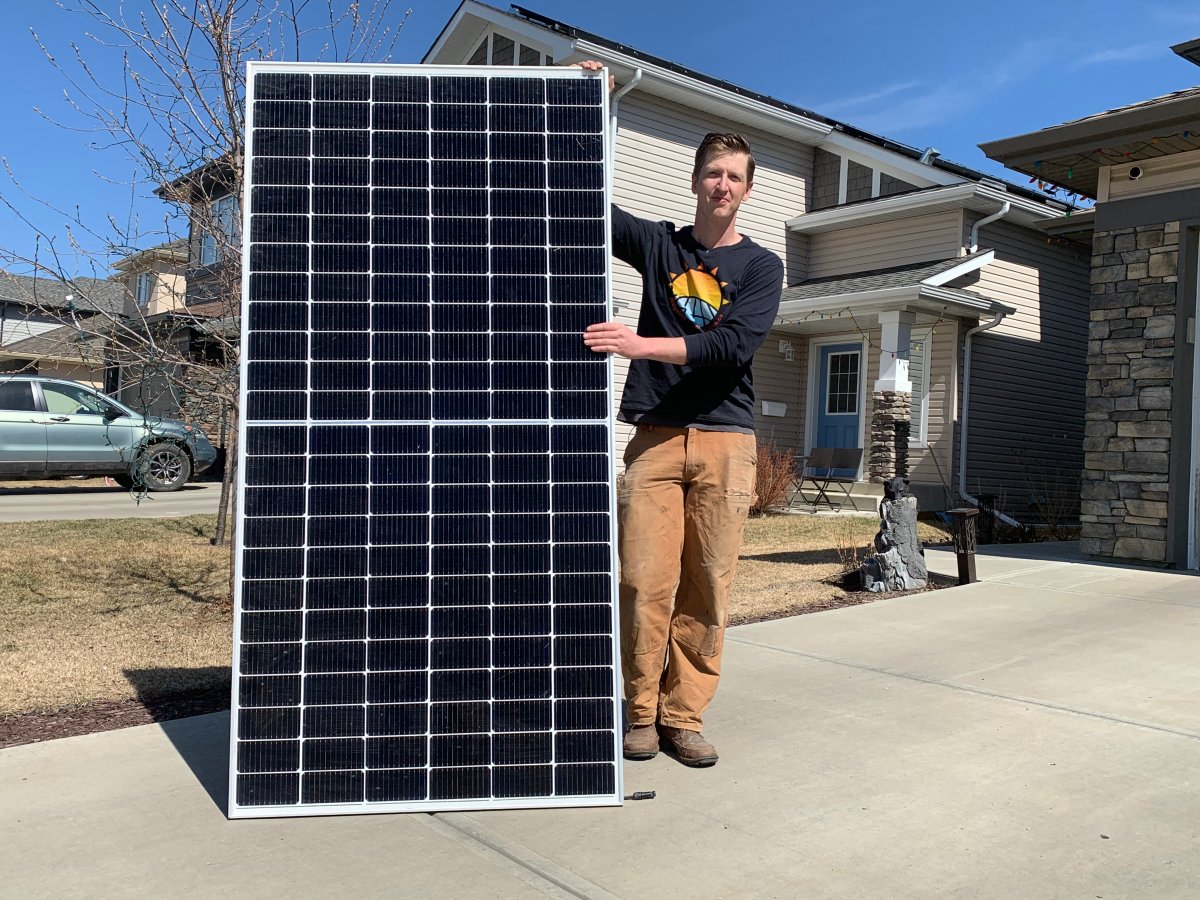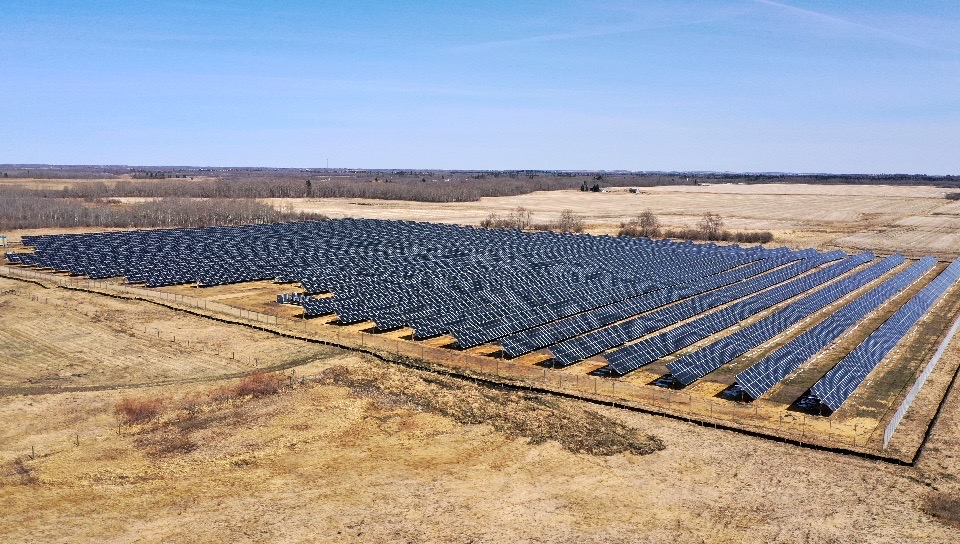A renewable energy boom is underway in the heart of oil country, as vast new projects harness Alberta’s bounty of wind and sun, drawing an increasingly eager and adaptable workforce.

Drew Mair feels fortunate to be so busy. For the owner of Ridgeline Power Solutions, an Edmonton solar installation company, business has never been better.
Like many Albertans, Mair’s career path has been shaped in the boom and bust cycle of the oil and gas sector. An electrician by trade, he spent ten years working in several oil installations in and around Fort MacMurray. Then came the downturn of 2015.
“You could see the writing was kind of on the wall. There weren’t as many jobs. There weren’t as many new projects on the books. And I was kind of disillusioned with working in oil and gas,” Mair tells Global News.
Mair had always harboured a keen interest in renewable energy, an interest he traces back to a grade school science project where he designed and built a solar-powered model boat.
“It’s part science, part magic… I think it’s just amazing — the fact that you can use the energy from the sun to turn it into the power that you use in your house every day.”
Despite Mair’s electrical skillset, there was no easy path into the solar business.
“I basically had to create my own job at the beginning because there weren’t enough companies that were hiring people to do solar,” Mair says.
Over a few short years, Mair networked and researched, started and grew his own company, and has seen the industry grow in leaps and bounds to the point where it is today.
He jokes about the adaptability that got him this far. “I’m part electrician, part roofer, part carpenter, but definitely heavy on the electrical. And, you know, that’s what we’re dealing with at the end of the day is power generation.”
“We’re the Sunshine State of the North”
The growing enthusiasm for renewable energy runs across the spectrum of scale. Many recent wind and solar power projects in the province stand out for their sheer size.
The Claresholm solar farm in southern Alberta recently went online. Producing 132 MW of electricity, it is now Canada’s largest solar project. But that won’t last long.

When the Travers solar farm near Vulcan goes online, it will be nearly three times the size, capable of powering 100,000 homes. Construction is set to begin later this year.
Greengate Power CEO Dan Balaban says the farm will be among the largest in the world, one of many massive renewable projects drawing on Alberta’s workforce.
‘We’re going to see a renewable construction boom in this province and all over the world over the next decade and beyond. And we have a lot of skilled labour here in Alberta,” Balaban says. “I believe a lot of those skills are easily transferable to renewable energy projects, which at the end of the day are really just large construction projects.”
Ideal market conditions are coming together with the region’s natural wealth in the wind and solar resource, says Balaban.
“We have some of the best onshore wind resources in North America. We’re the Sunshine State of the North. Our solar resource in Alberta is as good as the solar resource in Florida for the purposes of producing electricity.”

Canada’s Energy Regulator (CER) recently released a report forecasting that Alberta and Saskatchewan will lead the nation in the growth of renewable energy in the coming years, powered mostly by wind and solar.
Darren Christie, chief economist for CER notes the technology has become more affordable. “It is a really remarkable thing how quickly costs have fallen for wind and solar over the last number of years.”
Christie notes that Alberta and Saskatchewan have long lagged far behind hydro-rich provinces like Quebec, B.C., Manitoba and Newfoundland, where upwards of 90 per cent of power is generated from renewable sources. Closing the gap is driving much of the growth in wind and solar.
- Enter at your own risk: New home security camera aims paintballs at intruders
- High benzene levels detected near Ontario First Nation for weeks, residents report sickness
- Beijing orders Apple to pull WhatsApp, Threads from its China app store
- Boston Dynamics unveils ‘creepy’ new fully electric humanoid robot
“In both Alberta and Saskatchewan, with the phase-out of coal, it certainly creates an opportunity for that growth of renewables as they look to lower the carbon intensity of their power systems,” Christie says.
Montana First Nation: A small community making a big solar impact
While his crew manages the demand for solar installation in Edmonton, Drew Mair has shifted his focus to the utility side of green energy, working for Akamihk Energy.
Under the leadership of Chief Leonard Standingontheroad of the Montana First Nation, Mair is busy managing the largest solar farm in any Indigenous community in Canada.
With more than 36,000 modules and capable of powering more than 1,000 homes, the solar farm is a realization of Montana’s ambition to be a leader in green energy. It’s been seven years in the making according to Chief Standingontheroad and is the culmination of an effort that arrayed so many of the nation’s buildings with solar of their own. All the electricity produced feeds the grid through the nation’s own renewable energy company, Akamihk Energy.
Most of all, the renewable journey has opened up new career paths for many First Nation members.
“It’s made a big difference in the attitude of our nation members,” Chief Leonard Standingontheroad says.
“They’re really looking at it as an opportunity for careers. And we’ve had a lot of training during the planning of the solar farm. There are people that trained as installers and in different categories of tech, and that’s really been successful.”
For Mair, the chance to work with a community so heavily invested in green energy is a reward in itself. And it’s a far cry from his days in oil and gas.
“It’s amazing. I don’t feel like I have to get up and go to work. I don’t have work dread anymore. I like what I do, and I’m very grateful for that. I get to do what I like to do with like-minded people in a community that is really important to me,” Mair says.
De-polarizing the energy discussion
As renewable energy takes flight in Alberta, there’s a growing awareness among advocates of the need to depolarize the discourse in the sector.
“I believe we can be developing our oil and gas ‘and’ our renewable energy resources. The world is accelerating its transition to net zero.”
“But for the foreseeable future, we’re still going to need oil and gas in the mix. And I think it’s important that we invest in both so that we can continue to be prosperous today and ensure that we can be prosperous for generations to come.”

Mair sees his work as part of a larger trend that is opening new space in the long transition of the energy sector.
“I don’t begrudge anyone for going to work in oil and gas. How could I? Because that would make me a hypocrite,” he says.
“But there are alternatives and they’re very satisfying. And you can make a living out of them… So if by me not working in oil and gas, that frees up a position for somebody else, then that’s fantastic. “






Comments